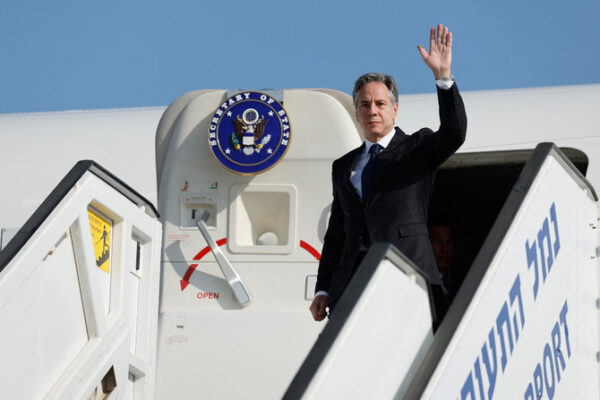U.S. envoy Amos Hochstein held talks with Lebanese officials in Beirut on Monday on conditions for a ceasefire between Israel and Hezbollah after Israel struck branches across Lebanon of a financial institution linked to the group.
Diplomacy has failed to cool down Israel’s raging conflicts with its two most dangerous and heavily armed regional militia foes – Hezbollah in Lebanon and Hamas in the Palestinian Gaza Strip – which are grinding into a second year.
Washington is hoping for a new push for peace in the Middle East following Israel’s killing last week of Yahya Sinwar, leader of Hamas and architect of the attacks on Israeli towns last year that precipitated Israel’s assault on the Gaza Strip.
U.S. officials are seeking to broker a truce in Lebanon, where Israel launched a ground campaign over the past month. It has killed most of the senior leadership of Hezbollah, an Iran-backed movement which says it is fighting Israel on behalf of the Palestinians.
Lebanon’s caretaker Prime Minister Najib Mikati said there was no alternative to U.N. Resolution 1701, but he added that “new understandings” could be reached to implement it, a statement issued by his office said on Monday.
A U.N. peacekeeping mission is mandated by Security Council Resolution 1701, adopted in 2006, to help the Lebanese army keep its southern border area with Israel free of weapons or armed personnel other than those of the Lebanese state.
Berri has been engaged in efforts to reach a ceasefire I Lebanon.
Beirut residents, already suffering from a devastating financial crisis, said they had little expectation that the U.S. official’s visit would bring a breakthrough.
“I see it dragging on, I see it taking longer. It’s still a play; where are we going? No one knows. Anyone who tells you they know is lying, especially these so-called leaders that appear on TV—they don’t know what they’re saying,” said Tony Rawandos, 61, owner of a car workshop.
Israel’s military has not slowed down its offensives and is also preparing to retaliate for an Iranian missile barrage earlier this month, though Washington has pressed it not to strike Iranian energy facilities or nuclear sites.
Iran has complained to the U.N. nuclear watchdog about Israel’s threats against its nuclear sites, foreign ministry spokesperson Esmaeil Baghaei said on Monday.
The U.S. military has rushed its advanced anti-missile system to Israel, which is now “in place”, U.S. Defense Secretary Lloyd Austin said during a trip to Kyiv.
Austin declined to say whether the Terminal High Altitude Area Defense system, or THAAD, was operational. But he added: “We have the ability to put it into operation very quickly and we’re on pace with our expectations.”
ISRAELI CONDITIONS
Israel’s campaign in Lebanon has driven 1.2 million people from their homes. It says its aim is to drive Hezbollah fighters from the border region so tens of thousands of Israelis can return to homes they were forced to flee over the past year from Hezbollah cross-border fire in solidarity with the Palestinians.
Israel has given the United States a document with its conditions for a diplomatic solution to end the war in Lebanon, Axios reported on Sunday, citing two U.S. officials and two Israeli officials.
Israel demands its forces be allowed to engage in “active enforcement” to make sure Hezbollah does not rearm near the border, and wants its air force to have freedom of operation in Lebanese air space, Axios reported, citing an Israeli official.
A U.S. official told Axios it was highly unlikely that Lebanon and the international community would agree to Israel’s conditions.
Over the last year, Lebanese officials estimate that more than 2,400 people have been killed. Fifty-nine people have been killed in northern Israel and the occupied Golan Heights over the same period, say Israeli authorities.
Reuters


Leave a Reply
You must be logged in to post a comment.